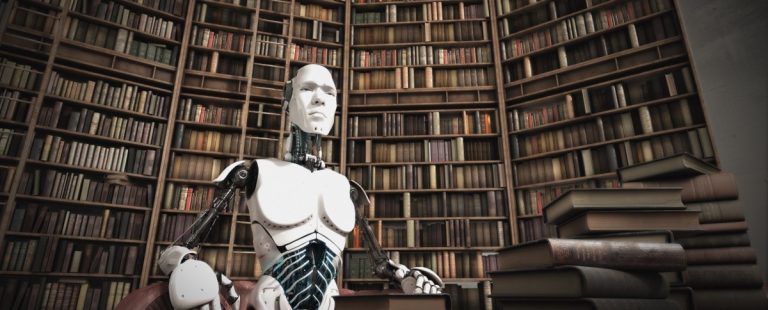
Simply put: Robots won’t replace teachers because they can’t inspire us.
In a world where young people are retreating more and more into virtual unreality, the teaching profession has become more important than it ever was. It is teaching that keeps it real – teaching that keeps young people alive.
It’s the talk of the town – when you say the word “future”, you hear “robots”. Artificial intelligence is rapidly growing, and that fear of losing your job to technology has become very real.
Even the tech wizard himself, Steve Jobs, believed that while technology can solve many societal problems, it’s not as simple as handing it over to a computer. At least not when it comes to teaching.
“The most important thing is a person. A person who incites your curiosity and feeds your curiosity; and machines cannot do that in the same way that people can,” Jobs said, according to a transcript of his famous 1995 interview with Computerworld’s Daniel Morrow.
As such, going by Jobs’ argument, the notion that intelligent machines will achieve higher greatness over one of an educator within a classroom is an inaccurate one that blindly disregards all that a teacher offers.
Gin Tan, a former English teacher at the Mont Kiara International School in Kuala Lumpur, Malaysia, believes teamwork further educates students, and that this goes way beyond the classroom.
“Teachers are not only there to support and gauge the needs of students in terms of their skill level and basic knowledge – teachers create situations for students to work together and collaborate.
“These lessons allow students to apply what they are learning to their everyday lives,” she tells Study International News.
With teamwork comes social interaction between students, teachers, administrators and parents. As the late psychologist Albert Bandura explains in the Bandura Theory, children learn in social environments by observing and imitating the behaviour and influence of others. Individuals need to feel a sense of belonging and have meaningful connections, all of which a machine cannot provide.
The reality is, the more connected people are to technology, the more disconnected they are (physically) to other people.
And the fact is, teachers are mentors. They are supporters. They are our inspirations. Inside and outside of the classroom, they are there for us. Better yet, they entertain us.
TheConversation:: What is the role of a teacher? https://t.co/QWgW3hpz6L
— VocEdAustralia (@VocEdAustralia) September 13, 2016
Nothing can be more boring than sitting in a classroom with a monotone, boring, non-humorous robot teaching us about the world we live in. Can you imagine a robot teaching the oppression of women in our society today with such passion and motivation that it inspires a young woman to sign up for the next Women’s March? Not likely. The most powerful divide between living things and artificial intelligence is empathy.
However, we live in a time of various possibilities and changes happening at every turn.
A leading educationist recently even predicted the replacement of teachers with robots to happen in the next 10 years as the new one-to-one learning revolution. This will apparently help students succeed way beyond their capabilities. Robots will ensure to take time for every student, providing them with individual attention, and allowing them to learn at their own pace rather than as part of a class.
'Inspirational' robots to begin replacing teachers within 10 years https://t.co/v4otxnwKD4 pic.twitter.com/Lg0HJ7qNhR
— IIAD Global (@IIAD_Global) October 12, 2017
The educationist, University of Buckingham vice-chancellor Sir Anthony Seldon, says, “everyone can have the very best teacher and it’s completely personalized; the software you’re working with will be with you throughout your education journey.”
This said-to-be more cost-effective way of learning delivers an approach of tailored learning where the robot will evaluate every response to adjust what is being learned and what needs to be learned. Therefore, the more advanced students can move forward with more work, whereas those that need extra help will be attended to, all within the same class.
But what we are forgetting is that robots are unable to create a culture of excellence. They are unable to push students to excel. Sure, we can’t deny the power of technology in education – but not to the point of completely replacing teachers altogether. Technology and teaching can coexist. Use robots as “learning tools” but scratch the belief that the future of teachers will result in a lack
Technology and teaching can coexist. Use robots as “learning tools” but scratch the belief that the future of teachers will result in a lack thereof.
Not every teacher is the same and not all believe in the same pedagogy, but students are adaptable. It would be unrealistic to put students in classrooms based on their learning style because the world does not function like that outside the classroom.
Children learn something new every day, and if it is a toss-up between knowing the date of the Civil Rights Movement or sitting with a new kid at lunch, I hope for the latter.
When it boils down to it, artificial intelligence is miles ahead of a teacher/educator when coming to efficiency. But I’ll leave you with Tan’s words:
“If efficiency is having the ‘right’ or ‘wrong’ answers – teachers and educators are human beings and are prone to making mistakes. But if efficiency means having a well-rounded education that focuses on student’s creative, academic, social and emotional wellbeing, then teachers win hands down.”
Liked this? Then you’ll love these…
Artificial intelligence, if used wisely, holds great potential for students, teachers
5 courses to graduate in so robots won’t steal your job







